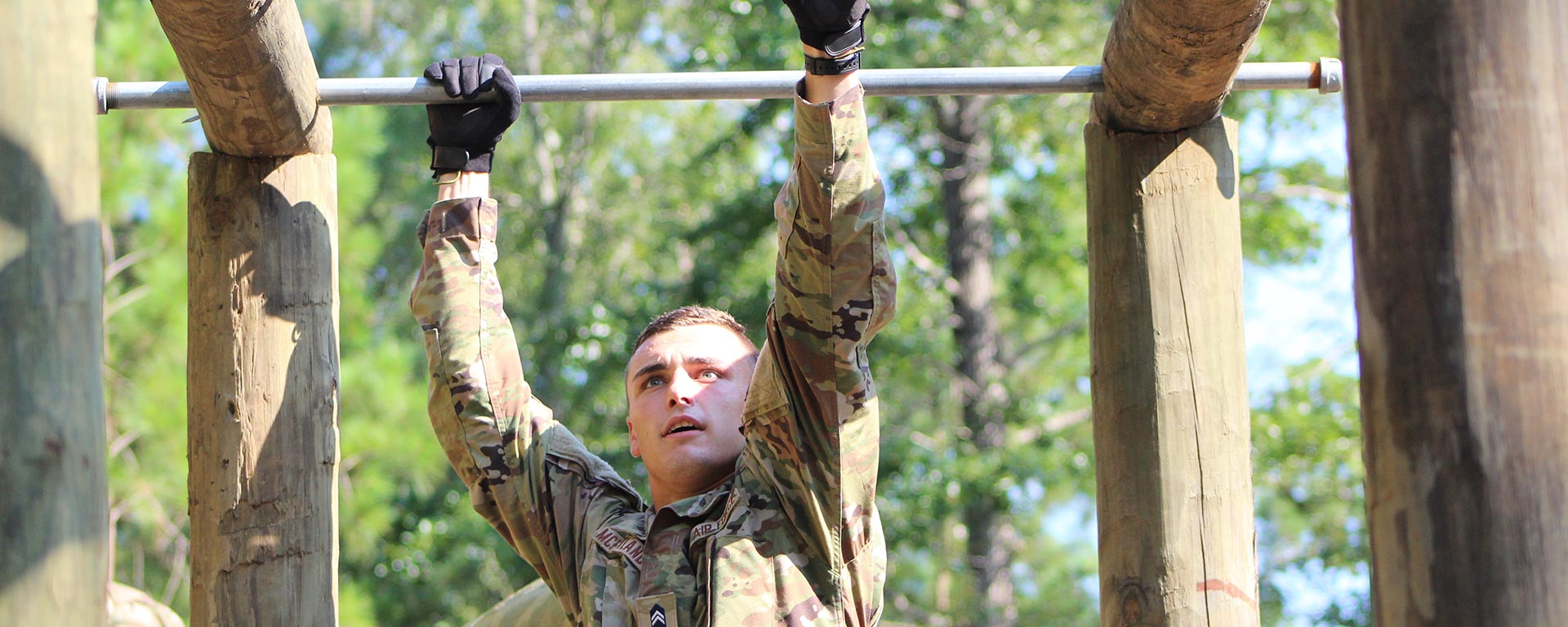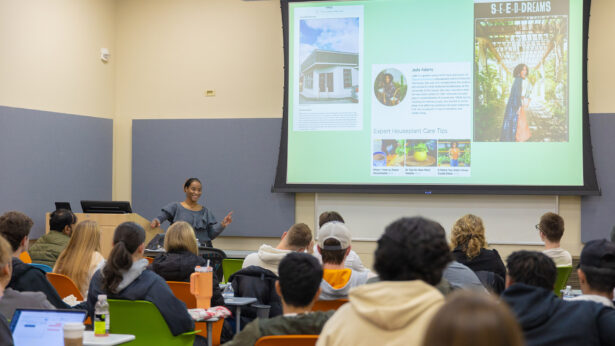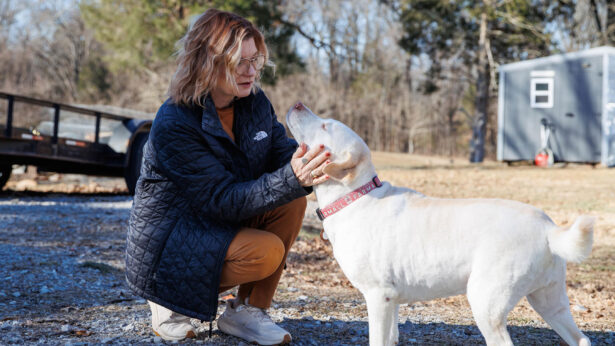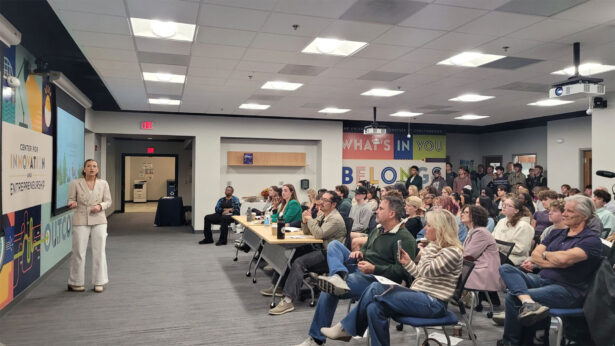Across the UT System, some of the next generation’s leaders can be found studying tactics in classrooms and turning out for workouts in the early morning hours.
Army ROTC prepares students on the campuses of Knoxville, Chattanooga and Martin. Air Force ROTC trains students at Knoxville.
While both prepare students to enter the military as second lieutenants, each campus commander also says it prepares them for life after they leave the military.
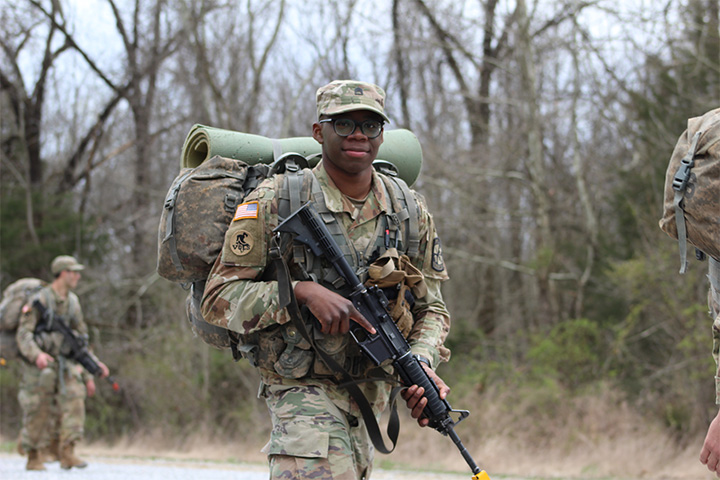
“I really argue that ROTC is good preparation for a life of selfless service,” says Capt. Stuart Allgood, who leads the UTC Army ROTC.
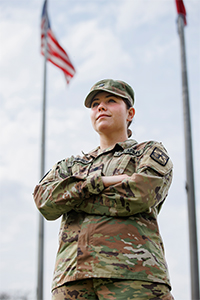
Army students can decide to join active-duty service, the National Guard or Reserves after they graduate—and they enter as second lieutenants. Almost all the Air Force ROTC (AFROTC) cadets choose active duty, but they must compete against cadets at 144 AFROTC detachments at universities across the United States and Puerto Rico. In 2022-23, the AFROTC headquarters registrar selected 15 of 20 UTK cadets to continue in the program after being evaluated for academic performance, physical fitness, scores on the Air Force officer qualification test and leadership capabilities. This group of cadets will eventually earn a commission into the Air or Space forces in 2025-26.
“Cadets that make it through AFROTC have to be on the top of their game because it’s a merit-based program,” said Air Force Lt. Col. William Estep. “Our program is known to produce officers who are ready to lead airmen and guardians in order to tackle tough challenges that our nation faces now and in the future.”
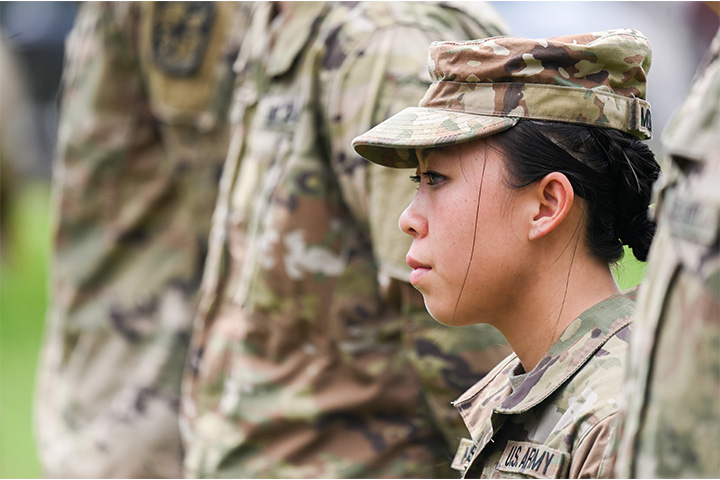
The UT Knoxville Army ROTC program is the ninth largest in the country. The 2022-23 recruiting class was ranked No. 1 out of the 268 Army ROTC civilian colleges.
“In almost every measurable area, it is in the top 10 percent of the Army ROTC programs in the country,” says Lt. Col. Justin Howe, who oversees the UTK program. “Couple that with the great experiences and education that you get at the University of Tennessee, you’re going to come out and be a well-trained officer upon commissioning.”
From the time students enroll as freshmen to when they graduate, these ROTC leaders watch the students grow and develop into those leaders.
“I can truly say their foundation is set,” says Lt. Col. Bernard House, who leads ROTC at UT Martin. “They’re living by the Army values. I can see their leadership. I can see their integrity. I can trust them. They’re truly ready to be lieutenants in the United States Army.”
ROTC leaders say multiple ways help students to graduate debt free. But it can all begin with just trying ROTC for a semester to see if they like the classes, the physical training and the camaraderie. Students take ROTC classes for credit. The classes cover the basics such as wearing the uniform and military history while advanced classes cover tactical operations and command.
“The Army is not for everybody,” Allgood says. “If you like it, you can join. If you don’t, you can walk away.”
Those who stay the course leave prepared for leadership.
In one of his last classes with the graduating seniors, Howe told them that, if his family and body would allow him, he would serve alongside them during their careers.
“As my time finishes, it is exciting to see them carry on the torch of all of us at the end of their Army service,” he says.
Three Army ROTC students and one Air Force ROTC student spoke about their time preparing for more than graduation.
MARK HANCOCK, who was elected to serve as UT Knoxville Student Government Association (SGA) president for 2023-24, plans to go into Army active duty when he graduates in May 2024 with a degree in political science with an emphasis in international affairs.
CIANA MEDONIS plans to go into Army active duty when she graduates from UT Chattanooga with a degree in criminal justice in May 2024.
CASEY THOMPSON-JUDKINS served as the cadet company commander for the Skyhawk Company before graduating in May with an agriculture business degree from UT Martin. She was commissioned as a second lieutenant in the Texas National Guard 449th Signal Company.
DANIEL McPARTLAND wants to begin working toward becoming an Air Force test pilot after he graduates from UT Knoxville with an aerospace engineering degree in May 2024. Thanks to a scholarship from the Air Force, he earned his student license and completed a cross-country solo flight. He will serve as AFROTC vice wing commander for the 2023-24 year.
Why did you join ROTC?
McPARTLAND:
Both of my grandfathers flew in the service. My uncle took me up for my first flight when I was really young, and then the Blue Angels inspired me. My cousin graduated from pilot training in the Air Force, and I talked with him about it. The Air Force was a good intersection of my passion of flying and interests and abilities in engineering.
THOMPSON-JUDKINS:
The main reason I joined was to help pay for my college. But over the years, it has really formed into something more. I enjoy being able to serve my country, promote leadership, be a leader to others, and just also graduate college debt free as well as pursue my master’s with tuition assistance from the National Guard.
MEDONIS:
I joined it basically because I was interested in the military a little bit. I wasn’t sure exactly about contracting at that time, but I really enjoyed meeting other people who had a lot of goals and that were working hard toward something similar.
HANCOCK:
My dad was a doctor in the Army for 13 years. Both of my brothers are currently in the Army. I have several cousins that have been in the Army, and both of my grandfathers served in the Navy. There’s just a big sense of pride for us of just being in the military. Growing up, I just always loved that culture.
How has joining ROTC changed you?
THOMPSON-JUDKINS:
I remember the first briefs I used to give. I’d be sweating. I’d be hot, and I was, like, ‘This is awful.’ Now, I can just get up and stand in front of people. I can definitely see the change in how I have grown as a person.
HANCOCK:
I don’t think I would be the person I am today without ROTC, just everything that it’s done for me. There’s a lot of good leadership skills you pick up in the Army, especially time management, accountability and discipline. I think it has really just helped me and kept me focused on the road within college.
What leadership skills will you carry with you?
THOMPSON-JUDKINS:
My definition for leadership is to lead others with respect, honesty and kindness. When I lead others, I’m always respectful to them because that’s how I want them to give me respect. I’m very honest. When something is going to suck, it’s going to suck, and I’m going to tell them because I don’t want it sugarcoated for myself, either. I like to lead with kindness because you don’t know what’s going on in their lives, you don’t know what has gone on in their background.
HANCOCK:
I think a big thing for me is accountability. I want to bring that forward for SGA, making sure that everyone’s doing their job, being accountable. Also, something I’ve learned from ROTC is to lean in for help. If we need help, reach out to people.
What does wearing the uniform mean to you?
MEDONIS:
I want to look the best I can because it’s not just representing me as a person. It’s also representing the program as well as my country. It’s definitely a sense of pride for everybody who has come before me, especially women in the military. I want to be able to represent them well as well.
HANCOCK:
There’s a personal connection that is really special to me because, when I wear the uniform and look down, my brothers are also wearing the same uniform. And my dad wore the uniform before me, too.
McPARTLAND:
You carry a sense of pride, but you feel responsibility—that’s the biggest thing. When we wear the uniform, we’re representing our detachment because we have a patch on. We’re representing the United States and the greater citizenship with the flag. We have to act in that regard and conduct ourselves professionally.
What should people know about ROTC?
MEDONIS:
ROTC is just a really good foundation. I think college can be very overwhelming, and it can be really hard to find your place. And so being a part of something, whether you want to go into the military or not, can be pretty transformational for who you are as a person. And the people at ROTC are generally pretty good people. Surrounding yourself with everyone that wants to do well and that discipline is really important to build up who you are as a person as well.
McPARTLAND:
We’re all here voluntarily and we’re here to protect the United States and the Constitution out of love for country. Within the next few years, you could be looking at the future leadership of the Air Force. It’s something really cool that not a lot of people think about.
Should future students consider ROTC?
MEDONIS:
I definitely tell people, if they’re thinking about coming into the program, just to at least try it out, give it a few months. You don’t have to necessarily contract or commission out of it, but if they’re passionate about just developing themselves as better leaders, as better people, I think it’s a really good program. It teaches you a lot about discipline and structure. It can also just teach you to work with all kinds of people as well.
2022-23
Army ROTC Cadets
UT Knoxville – 185
UT Chattanooga – 52
UT Martin – 46
Air Force ROTC Cadets
UT Knoxville – 107
